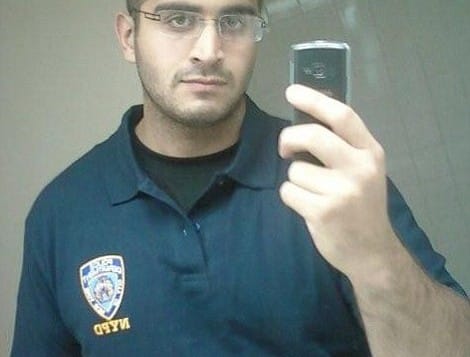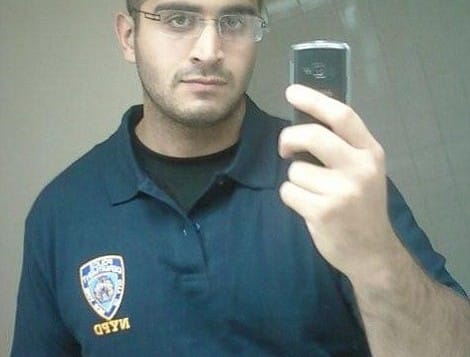Despite all the articles and analysis in the wake of the Pulse nightclub shooting, one important fact seems to have been completely overlooked: the shooter validated Ron Paul’s warning that American military intervention in the Mideast causes terrorist attacks.
On September 25, 2001, Congressman Ron Paul of Texas addressed the US House of Representatives. Two weeks earlier, a terrorist attack had destroyed four fully-loaded passenger aircraft, completely demolished three buildings at the World Trade Center in New York City, and left a large hole in the Pentagon. The devastation also included approximately 3,000 casualties, mostly civilians.
Congressman Paul reminded the assembly of his past opposition to American military intervention in other parts of the world, including the Middle East:
Mr. Speaker, I returned to Congress 5 years ago out of deep concern about our foreign policy of international interventionism and a monetary and fiscal policy, I believe, would lead to a financial and dollar crisis.
Over the past 5 years, I have frequently expressed my views on these issues and why I believe our policies should be changed….
I sought to thwart some of the dangers I saw coming, but as the horrific attack shows, these efforts were to no avail….
The call for a noninterventionist policy over the past year has fallen on deaf ears. My suggestions made here today will probably meet the same fate. Yet, if truth is spoken, ignoring it will not negate it.
Congressman Paul acknowledged the Bush administration’s claim that “the only reason for the suicidal mass killings on September 11 is that we are hated because we are free and prosperous.” But Paul presented another view: that the 9/11 attack – like previous suicide attacks – was really an attempt to resist American military intervention in the Mideast.
Our military presence in Saudi Arabia is what most Muslims believe to be a sacred violation of holy land. The continuous bombing and embargo of Iraq has intensified the hatred and contributed to more than a million deaths in Iraq. It is clear that protecting certain oil interests and our presence in the Persian Gulf helps drive this holy war.
Muslims see this as an invasion and domination by a foreign enemy which inspires radicalism.
War supporters excoriated Congressman Paul in the media. Instead of acknowledging that American foreign policy might contribute to terrorist attacks, they accused him of “blaming America” for the 9/11 attack. The actual effects of our interventionist foreign policy on terrorism were never seriously debated. On the contrary, in the rush to strike back, American leaders invaded both Afghanistan (where the 9/11 attack is alleged to have been planned), and Iraq. As it turns out, Iraq had nothing to do with the 9/11 attack.
Paul’s opponents brought this issue up when he ran for the Republican Party’s presidential nomination in 2008, and again in 2012. Once again, he was accused of blaming America for terrorism, and his views were not seriously debated in the news media.
But this time, Paul’s claims were backed by government research. Dr. Robert Pape teaches political science at the University of Chicago. He is also one of the world’s foremost experts on suicide terrorism. In 2005 his book Dying to Win: The Strategic Logic of Suicide Terrorism, was published. Pape studied every known terrorist attack between 1980 and 2004. His research contradicted several common assumptions:
[There is] little connection between suicide terrorism and Islamic fundamentalism, or any of the world’s religions…. Rather, what nearly all suicide terrorist attacks have in common is a specific secular and strategic goal: to compel modern democracies to withdraw military forces from territory that the terrorists consider to be their homeland.
Congressman Paul referred to Dying to Win in a speech before Congress on July 14, 2005.
If Paul and Pape were right, one would expect terrorism to increase with increasing American intervention in the Middle East. And according to The Economist, deaths by terrorism worldwide are at an all-time high. Recruiting of potential terrorists has also increased dramatically.
Lt. Gen. Michael Flynn, former Director of the Defense Intelligence Agency, discussed al Qaida’s recruiting with Der Spiegel magazine last year:
Zarkawi [the former al Qaida leader in Iraq] tried to bring in foreign fighters, but not in the way that [current al Qaida leader] al-Baghdadi has been able to do. At the peak of Zarqawi’s days, they may have been bringing in 150 a month from a dozen countries. Al-Baghdadi is bringing in 1,500 fighters a month, from more than 100 nations.
Although Gen. Flynn attributed the increase to better recruiting methods, it is unlikely that this reason alone explains the ten-fold increase in recruits.
Gen. Flynn also questioned the assumptions that led to the invasion of Iraq, specifically noting the lack of concern about the 9/11 attackers’ motives:
When 9/11 occurred, all the emotions took over, and our response was, ‘Where did those bastards come from? Let’s go kill them. Let’s go get them.’ Instead of asking why they attacked us, we asked where they came from. Then we strategically marched in the wrong direction….
[The Iraq war] was a huge error. As brutal as Saddam Hussein was, it was a mistake to just eliminate him. The same is true for Moammar Gadhafi and for Libya, which is now a failed state. The historic lesson is that it was a strategic failure to go into Iraq. History will not be and should not be kind with that decision.
It should be noted that Gen. Flynn does not advocate withdrawal from the region, but rather a long-term occupation using local forces as “the face of the mission.” Flynn cited the ongoing mission in the Balkans as an example.
None of this seems to have affected America’s military policy. Non-interventionism is still not debated in the mainstream media as a viable option.
But a former security guard made the connection between terrorism and American intervention in the Mideast explicit when he killed 49 people in Orlando, Florida.
Reports of the Pulse nightclub attack assumed that Omar Mateen was driven by religious hatred of America’s socially tolerant attitude toward LGBT people. A CBS News report gave the prevailing interpretation:
Megan Currie, a Joy Metropolitan Community Church member, said during a Sunday morning sermon that Mateen’s attack was an effort to put fear in the gay community.
‘This was a hate crime and this happened because someone was homophobic.’
But is this assumption correct? There are reasons for doubt.
For one thing, several Pulse patrons have come forward and told authorities that they saw Mateen at the club on several occasions, and that he interacted with them on gay websites. At least one man claims to have had sex with Mateen.
These revelations have caused some reevaluation of Mateen’s thinking. According to an article in the Miami Herald:
The FBI initially touted the theory that US-born Mateen was motivated by his support of the notorious Islamic State, which as part of its radical ideology has expressed a visceral hatred for gay people. But the portrait has turned far more complicated, with experts now saying Mateen appeared to be driven by a dangerous mix of bigotry, self-loathing, and perhaps, mental illness.
But if Mateen was suffering from an inner conflict between his religion and repressed sexual urges, it wasn’t apparent to other patrons:
Chris Callen, who worked at Pulse as a performer, said he had seen Mateen dozens of times. According to Callen’s estimate, Mateen visited Pulse twice a month over three years.
‘He was very friendly when we said, “Hi.” He didn’t seem like the kind of guy who just did what he did. It makes no sense,’ Callen said. ‘My partner said he was very nice (and seemed) comfortable.’
Transcripts of Mateen’s 911 calls and his discussions with crisis negotiators could shed light on what he expected to accomplish. Unfortunately, the FBI has prevented disclosure of this information to the public, and to date the full transcript has only been released for one of Mateen’s three calls to 911.
However, Attorney General Loretta Lynch discussed the transcripts with reporters on June 19. If Mateen’s primary motive was hatred of gay people, it was strangely absent from his conversations with the authorities:
Mateen didn’t discuss his views about gay people, [Lynch] said: ‘He didn’t get into that. And so we’re still exploring why he chose this particular place to attack.’
However, Mateen did discuss his motivation for the attack:
‘He talked about his allegiance to a terrorist group,’ Lynch said on CNN’s ‘State of the Union.’ And, ‘he talked about his motivations for why he was claiming, at that time, he was committing this horrific act. He talked about American policy in some ways.’
The fact that Mateen mentioned American policy as his reason for committing the attack, but did not mention LGBT people or gay lifestyles casts doubt on the theory that his primary motive was “a visceral hatred of gay people.” In fact, the information revealed to date does not include any statements from Mateen at all to indicate that he was driven by homophobia. It may be that the derogatory remarks he made to co-workers about gay people were intended to hide his own homosexuality.
Mateen’s actions during the attack do not support the theory that he was motivated by hatred of LGBT people, either. Several witnesses reported that Mateen tried to avoid shooting black people, at least during part of the attack:
‘Our friend in the bathroom said Mateen had a racial thing,’ [Pulse patron Kyle] Moore said. ‘He was saying, “I don’t have a problem with black people.”‘ Their friend said one woman in the bathroom initially escaped being shot by saying, ‘I’m black! Don’t shoot me.’
But why would race matter? There are no reports of Mateen asking if anyone in the club was heterosexual. So if Mateen was wreaking God’s vengeance on gay people, why wouldn’t he be just as willing to kill black gays as gay people of other races? Perhaps Patience Carter’s description of events that occurred while she was hiding in the restroom provides a clue:
‘Are there any black people in here?’ Mateen asked, according to Carter.
She said she was afraid to reply, but another black person hiding in the bathroom did.
‘I don’t have a problem with black people,’ Mateen reportedly said in reply. ‘This is about my country. You guys suffered enough.’
The fact that Mateen said the attack was about his country, not Islam or the LGBT lifestyle is revealing. In fact, although Mateen pledged allegiance to the leader of the Islamic State, none of the accounts indicate that Mateen wanted to force his religious code on others. On the contrary, Mateen stated his objective quite clearly:
Mateen told negotiators he was ‘an Islamic soldier,’ and that he was demanding America ‘stop bombing Syria and Iraq,’ giving that as the reason he was ‘out here right now.’
So, there it is in the shooter’s own words: he committed his despicable act to stop America from “bombing Syria and Iraq.” If the anti-gay sentiment entered into Mateen’s planning at all, it was not important enough to mention to the 911 receptionists or the Orlando crisis negotiators. More significantly, it wasn’t important enough to mention to the Pulse patrons whose behavior he would presumably have been trying to change.
Those facts do not support the Bush administration’s claims that terrorists attack Americans because they are jealous of our freedom and our prosperity. They also do not support the popular view that Mateen’s attack was a hate crime, driven by Islamic intolerance of gay people. Instead, Mateen showed that Ron Paul was right: American intervention in the Mideast causes resentment, which inspires terrorist attacks.
Conversely, if Congress and President Obama had taken Paul’s advice and pursued a policy of nonintervention, the attack in Orlando would have never taken place.
Reprinted with permission from Antiwar.com.


